- Home
- Jane Peart
Senator's Bride Page 13
Senator's Bride Read online
Page 13
Bryanne, standing in the center of the room, was suddenly stricken. Sadly she shook her head. "I'm afraid not. I guess I've forgotten almost everything about living in Virginia."
Lynette's face mirrored her sister's distress, and she went to her and hugged her reassuringly. "Don't feel bad, Brynnie. It was silly of me to think you would. After all, you were only four when Mama took you with her to England that spring. But don't worry. I'll tell you everything you want to know. And we'll go over to the island as soon as possible. Right now it's closed, because Daddy and Gareth are still in New Mexico. But now that you're here, they'll come back and we can all be together again. Like a real family."
Bryanne glanced around the room. It was a lovely, feminine room and she saw that Lynette must have added several thoughtful touches to welcome her. There was a small heart-shaped pillow with her name embroidered on it, prominently displayed on one of the two brass beds. On the dressing table were two of everything—two bottles of cologne, two boxes of dusting powder, two toilette sets of brush, comb, and hand mirror.
"Do you want to unpack first?" Lynette asked. "Or shall we just talk?"
A little dazed, Bryanne just nodded.
"Then let's sit over here, and I'll try to tell you all the things I remember about us." Tugging her gently by the hand, Lynette led her to the window seat, and they sat down, facing each other. "Well, we did almost everything together even though I was three years older. Mama . . . you do remember our mother, don't you, Brynnie?" Lynette looked anxious.
"Yes, but only vaguely. I don't even know whether it's because Grandmother has so many pictures of her, or if I really remember her," Bryanne replied. "She was very beautiful, wasn't she . . . and Grandmother says you look very much like she did."
"A little maybe . . . my coloring," Lynette said quickly and went on. "She was so sweet, Brynnie, always laughing and playing with us. We used to have tea parties out in the garden, and Mama would come. . . ."
As her sister talked, telling her wonderful stories of their childhood, nudging the memories that had been locked away for so many years, Bryanne actually began to recall the scenes, the games, the happy times Lynette was recounting.
Little by little, she felt a spreading warmth, a gradual easing of a tension she had not even been conscious of, a filling of a deep emptiness. Her sister's voice was low and comforting. Something gentle and tender was happening to her, as if loving arms were being wrapped around her, embracing her, soothing that small hurting spot in her heart she hadn't even known was there . . . until now. The healing had begun.
chapter
18
JILLIAN WOULD never forget her first impression of Cameron Hall. They had arrived just as the sun's last brilliant rays turned the tall windows across the front to flaming jewels. Set as it was on park-like lawns surrounded by oaks and beech trees, the splendid house had a kind of majestic dignity. It seemed a house worthy of awe and respect. It was exactly the kind of house, given her own privileged background, that under other circumstances, might have been her birthright.
But Jillian wasn't coming to Cameron Hall as a guest, she reminded herself, but as an employee. She didn't know how she would be regarded by Bryanne's other grandmother, Blythe Cameron. But on the train from Richmond, Mrs. Devlin had given her a capsule version of the situation.
"Since this is your first trip to America, Jillian, you should be aware of the differences in our two cultures. Americans tend to be quite casual about everything—manners, etiquette, protocol. Things that are important to Britishers don't seem to matter at all in the States. And the South is a case unto itself." Mrs. Devlin had laughed a little. "I don't really suppose there's any way to prepare you for Virginia or Virginians! Goodness knows, I spent half my life in England, trying to explain myself, and it was no use."
She had shaken her head, twisting the pearls at her neck with one graceful hand, looking out the window of the train somewhat pensively. "Cameron Hall, where we'll be staying, was my childhood home. My father's ancestor built it, and the Cameron family has lived there for generations. My sister-in-law, Blythe, my brother Rod's widow, is mistress there now, of course, and things will probably be quite different from what I remember. Blythe originally comes from California. . . ."
From the inflection in Mrs. Devlin's voice, that state might have been the Australian outback, Jillian thought with amusement. But she wasn't through.
"My nephew Scott will inherit it eventually. Of course, Blythe is still young enough to marry again . . . who knows? Or Scott . . ." She gave a small indifferent shrug. "But we shall see. I really don't know what to expect anymore. It's been years since I've been here, since before the war. As you know, my brother died when we were in Switzerland two years ago, and there was no way I could have left to come for his funeral . . . and no real reason to come after that."
Since, in England, the position of a governess was ambiguous, sometimes considered only a little above a servant, Jill had been uncertain how she might be received in the Cameron household. But the warm welcome given her had dispelled any of her apprehensions. They could not have been more gracious.
Now Jillian looked with pleasure around the bedroom to which she had been shown by Bryanne's sister. From the next room, she could hear the low murmur of their voices. Since she had had no sisters of her own, Jillian had often envied friends who did. She had imagined how comforting and enjoyable it must be to have a companion with whom to share one's life, and she hoped these two, who had been separated for so long, might now be able to bridge the gap quickly and become close.
Jillian took off her hat and the jacket to her suit, and untied the bow at the neck of her blouse. Glancing into the pink-tiled bathroom, she decided she would take a long soak and wash her hair.
As she lay in the tub, relishing quantities of scented bath salts she had poured in from the glass container on the shelf, Jillian rested her head and let her thoughts ramble.
Her thoughts, however, instead of being peaceful ones, were vaguely unsettling. Suddenly she was aware of the luxury surrounding her, simultaneously remembering the spirit-deadening poverty she had endured before Mrs. Devlin had hired her. It would be disastrous to become attached to this kind of life, she warned herself. Jillian knew the plans Mrs. Devlin had for Bryanne, the reason she had brought her granddaughter back to Virginia. For the past two years, the older woman had been polishing her, exposing her to the cultural "finer things" of life—the symphony and the ballet, the riding and dance lessons, the trips to museums and galleries all over Europe. All this to prepare Bryanne for the life that was to be her legacy from the past.
Mrs. Devlin had been very open about all this with Jillian. In fact, Jillian was a willing accomplice from the start. There was only one other step—a year of finishing school, followed by her debut. I f the result of all this proved to be the brilliant marriage Mrs. Devlin had envisioned for her granddaughter, where would that leave Jillian?
At this thought, she sat up in a cloud of suds. When Bryanne married, what then? No bride, no matter how affectionately bonded, took her governess with her into marriage. What then, indeed?
She smiled ironically. She should forget any notion of continuing this lavish lifestyle. All this could disappear as quickly as the soap bubble that burst on the surface of her bath, as quickly as Cinderella's coach-and-four had vanished at the stroke of midnight. And there was no Prince Charming to rescue her and take her to the castle to live.
The water having grown cold, Jillian got out of the tub, wrapped herself in one of the large Turkish towels, and rubbed herself briskly. If . . . or rather when that happened, her own future loomed precariously. Should she return to England, or stay in America and look for another position? Well, as Uncle Greg always said, she'd cross that bridge when she came to it.
She put on a robe, then stretched out on the flowered chintz chaise lounge and picked up one of the glossy fashion magazines on the table beside her. As she thumbed through it idly, her head began
to nod and she drifted off to sleep.
When she opened her eyes again, the house was quiet, so devoid of sound there might have been a moat about the place. A glance at the porcelain clock on the mantelpiece above the white marble fireplace told her it was nearly six-thirty. She'd better get dressed right away. She wouldn't want to be late to dinner on her first night at Cameron Hall!
Scott came in the front door and closed it quietly. He stood in the entrance hall for a moment, listening for some sign of activity. Hearing none, he concluded that everyone must be resting. It had been a hectic day.
Crossing the hall toward the library, something caught his eye, and he glanced in through the open doors of the drawing room and saw a young woman standing in the curve of the piano. She turned at his approach. Seeing her, he moved as if in a dream and paused again at the threshold, momentarily unable to speak.
She was in every way the personification of the picture he had carried for years in his imagination, the ideal woman he would one day possess. Her soft brown hair was a cloud about her face, her complexion like lustrous pink pearls, her eyes so clear and blue they took his breath away. The phrase about eyes being "the windows of the soul" came effortlessly to mind. She was wearing a white ruffled blouse and a slim gray taffeta skirt that barely reached ankles as slender and dainty as a thoroughbred's.
"Hello!" he said. "I'm Scott Cameron."
"I'm happy to meet you, Mr. Cameron. I'm Jillian Marsh, your cousin Bryanne's governess."
Recovering from his initial reaction and regaining his usual poise, Scott said smoothly, "Of course. I must apologize, Miss Marsh. I'd forgotten Aunt Garnet was scheduled to arrive today. I hope you had a pleasant trip."
She had time only for a polite reply before they were joined by Mrs. Cameron. Watching their affectionate exchange and his gentle manner toward his mother, Jillian was impressed. Contrary to everything Mrs. Devlin had led her to expect from American men, Scott Cameron measured up in every way to any of the young Englishmen she had known—products of Eton or Harrow or Oxford.
Remembering her own fantasizing earlier this evening, Jillian felt an inner amusement. This was the heir apparent to the "castle" in which she was luxuriating. Even if he could be categorized as "Prince Charming"—and he was good-looking enough to be—he surely already had his "princess" picked out, with a half-dozen others waiting in the wings!
chapter
19
A FEW DAYS after their arrival, Bryanne, Lynette and Jillian went horseback riding early one morning. It was still quite cool, and dew glistened on the grass as they set out. They had gone only a short distance down the drive, headed for the nearby woods, when a horseman trotted toward them along the bridle path.
"Oh, it's Sean! I didn't know he was back!" Lynette exclaimed with a lilt in her voice. She drew her horse to the side, explaining as he approached, "Sean manages our stables and is just back from a buying trip to Kentucky. He's always looking for new stock to add to Cameron Hill Farms." She raised her hand in greeting. "Good morning, Sean!"
"And a good mawrnin' to you!" he called back, coming alongside her horse.
Lynette turned in her saddle. "I'd like you to meet my sister Bryanne, Sean, and Miss Marsh, her companion. They've just come from England. And this is Sean McShane."
Sean pulled off his tweed cap, revealing thick blond hair that glinted in the pale sunshine. "I'm that pleased to meet you both." Looking directly at Bryanne, he added, "I know Lynette's been longin' for you to come."
At his greeting, Bryanne could feel a sudden rush of warmth in her cheeks. While he and Lynette carried on a brief exchange about his Kentucky trip, he sat relaxed in the saddle, giving Bryanne time to observe him.
She watched the way he gentled his horse as they talked, his hands strong and firm. His face had a ruddy glow, and he had quite the nicest smile she had ever seen. Under a creamy cable-knit sweater, his shoulders were broad, and from the length of his brown-breeched legs and the height of his boots, she guessed he must be very tall.
"Want to ride along with us?" Lynette asked him.
"Another day maybe. I've been out since dawn. It was good to get back on Shannon after ten days away, but I need to rub him down. Enjoy your ride now." His gaze moved to Bryanne again and he smiled at her and tipped his cap. Turning his horse, he rode off in the direction of the stables.
"He's such a nice person," Lynette said, gazing after him as he cantered down the path.
Something in Lynette's voice made Bryanne wonder if there might be more than friendship between her sister and Sean McShane. And almost immediately there followed a little twinge of disappointment.
As they entered the woods, she fell a little behind Lynette and Jillian. If what she thought she had noticed was true, who could blame Sean? What young man wouldn't be attracted to her sister?
Even this early in the day, Lynette was perfection. Her long dark hair swept back, tied with a red bow, fell in waves nearly to her waist. She had on a red turtleneck sweater under a beige and red checked jacket. She was so slender and graceful, yet a competent horsewoman.
Besides her beauty, Lynette had so many other attractive qualities that endeared her to others—a genuinely sweet nature, a pleasant personality, a delightful sense of fun. Bryanne had not laughed so much in ages. Who could resist Lynette? Sean McShane would be a fool not to love her!
Even so, some small wistful wish crept into Bryanne's heart. Why couldn't it be me?
In the weeks that followed, Bryanne's attraction to Sean McShane increased rather than diminished, even though she tried to tell herself that caring for him was an exercise in futility. He was always friendly and certainly seemed comfortable enough with the rest of the family on the rare evenings he joined them at the house for dinner.
But she hardly ever had a chance to talk to him alone. For the three of them—Lynette, Jillian, and Bryanne—did everything together. Riding became an almost daily ritual, and Sean often saddled up and rode along with them.
However, as the days went on and she observed them together, Bryanne began to wonder if her first impression might have been wrong. Maybe they were simply good friends completely at ease with each other. But what did she know about romance? Bryanne knew only what she had read in romantic novels and how much reality was in them? Still, she longed for the chance to get to know the handsome young Irishman better. But they never had a chance to be alone.
chapter
20
WITH THE ARRIVAL of Aunt Garnet and her entourage, and his subsequent uncharacteristic daze over the lovely English lady, Scott had almost forgotten about Hal Woodridge's visit to his office at the Messenger. However, he was sharply reminded two weeks later when he went to the Mayfield Inn for lunch.
As he entered the Grill Room, he spotted Kip Montrose and Woodridge, sitting at a corner table, deeply engrossed in conversation. So intent were they on their discussion that they failed to see Scott pass, and they soon left without noticing him at another table. Curious, Scott thought. Wonder what that was all about?
The following week Frank Maynard, whose family were longtime friends of the Camerons, called him with an invitation to meet for lunch.
Scott arrived at the inn fifteen minutes early, in time to see the lobby thronged with ladies in flowered hats and pastel dresses, and realized that Frank had inadvertently chosen a day when the Mayfield Ladies' Heritage Society was having its monthly luncheon meeting. Hoping to avoid being cornered by their assertive secretary and coerced into giving them some space on the Local Events page, he ducked behind one of the pillars until he could signal a waiter to be seated.
Shortly afterward, Frank Maynard entered the Inn and crossed the lobby with quick purposeful strides. Pausing at the archway into the Dundee Room, he surveyed the room, and seeing Scott at a far table, he raised his hand in greeting and started toward him.
Less than twenty minutes into lunch, Frank told Scott the reason for this get-together. He was giving serious consideration to runni
ng for the senate seat vacated by Senator Wilcox. "I'd like you to support me, Scott. . . and, of course, the paper's endorsement would be a big help."
Frank Maynard had a good face, Scott mused—strong features, serious expression, keen, intelligent eyes. The man's integrity was unquestioned. The Maynard name was one of the oldest and most respected in the county. A lawyer, Frank had been a junior partner in a prestigious Richmond law firm until a few years ago when he returned to Mayfield and moved into his old home. The house had long stood empty, had been scheduled for demolition with some others to make way for a proposed new highway through that part of town, which so far had not received federal funding and was being fought by Mayfield's "old guard." Frank had evidently paid up the delinquent taxes, moved in, and started restoring his old family home. Then he had opened his own small law office in one of the older buildings across the Square from the Mayfield Messenger.
"Why don't we go over to your office after we finish?" Scott suggested. "We can talk privately. I don't think it's such a good idea to discuss it here." He smiled and inclined his head toward the table of ladies nearby. "You never know who could be listening and might be tempted to carry a tale you might not be ready to tell."
"Fine," Frank agreed.
Personally, Scott liked Frank and thought he would make a viable candidate. But he'd like to ask some probing questions, take a reading, decide for himself if he could conscientiously endorse him.
Back in Frank's office, which had a comforting old-fashioned shabbiness about it, they continued their conversation, more freely now that there was no danger of being overheard.

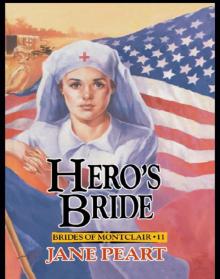 Hero's Bride
Hero's Bride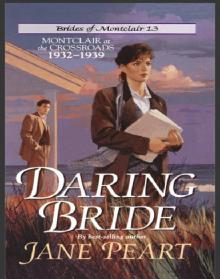 Daring Bride
Daring Bride Runaway Heart
Runaway Heart Promise of the Valley
Promise of the Valley Gallant Bride
Gallant Bride The Pledge, Value
The Pledge, Value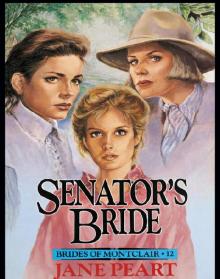 Senator's Bride
Senator's Bride Valiant Bride
Valiant Bride Shadow Bride
Shadow Bride Destiny's Bride
Destiny's Bride A Tangled Web
A Tangled Web Folly's Bride
Folly's Bride The Promise
The Promise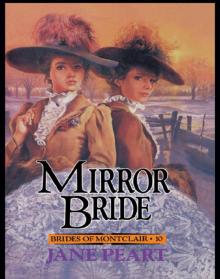 Mirror Bride
Mirror Bride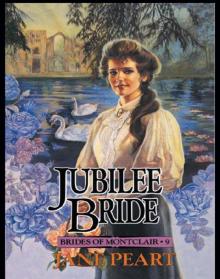 Jubilee Bride
Jubilee Bride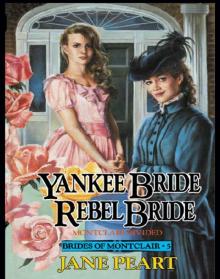 Yankee Bride / Rebel Bride
Yankee Bride / Rebel Bride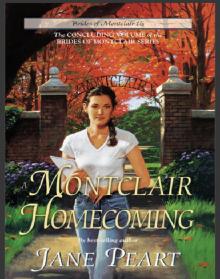 A Montclair Homecoming
A Montclair Homecoming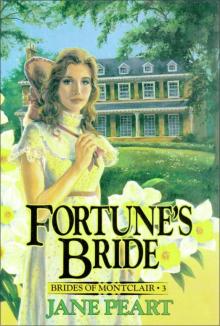 Fortune's Bride
Fortune's Bride Undaunted Spirit
Undaunted Spirit Love Takes Flight
Love Takes Flight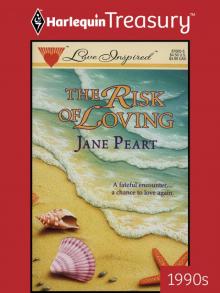 The Risk of Loving
The Risk of Loving The Pattern
The Pattern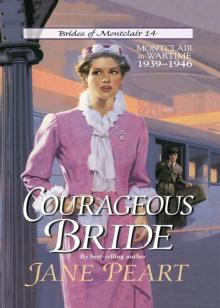 Courageous Bride
Courageous Bride